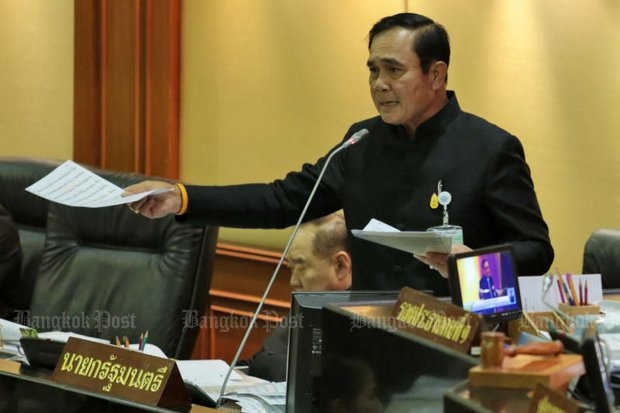
Gen Prayut Chan-o-cha's proposed four questions must have many people stumped. What is he thinking? What's the purpose of posing such questions out of the blue?
Immediately after his public address, howls of protest rose up among academics and political observers, not to mention ridicule on social media.
Most critics believe it was to gauge public reaction to a possible postponement of general elections scheduled for around the end of next year, thus prolonging his stay in power.

Wasant Techawongtham is former News Editor, Bangkok Post.
Out of the cacophony of comments, one by National Human Rights commissioner Angkhana Neelapaijit is most to the point.
"The questions he asked are so ridiculous," she told the Bangkok Post.
She said people have had enough of this government which has stayed in power for more than three years without achieving the reforms it promised at the outset.
"So I want the prime minister to keep his promise to return democracy to the Thai people by following the government's roadmap to the election next year."
The stream of comments and criticism piqued Gen Prayut so much that he refused to talk to the press for a couple of weeks. Various government spokesmen tried to defend the proposal as Gen Prayut's desire to understand people's needs and to let them have a say in the design of the country's future.
They forgot to mention that he wasn't so generous before when people tried to provide input on the new constitution or important legislation. Many of these new laws were rushed through the rubber-stamp National Legislative Assembly.
They also forget that, in a democracy, if people get a government they don't like, they can vote it out in four years or earlier. But in a juntacracy, they have no such choice.
It's almost hilarious the way the Interior Ministry and junta supporters go about treating Gen Prayut's four questions as if they are legitimate inquiries worthy of answers and not an attempt by a neurotic leader to reaffirm public approval.
The Interior went so far as employing all of its official machinery to gather public input for the questions, but only from people willing to personally show up and produce citizen IDs. It might as well ask to take fingerprints and DNA swabs while they are at it.
It does not take a neuroscientist to guess what results such an exercise would produce. It merely reaffirms the military regime's tendency to hear only what it wants to hear.
If the regime sincerely wants to know what people think, it is certainly should not ask such inane questions with such non-scientific methods.
In a public survey, you start with stating its purposes. Then questions are formulated in such a way that they will not lead the participants one way or the other to ensure the answers elicited are made freely and independently. And it should not be necessary to ask the participants to identify themselves. If they want to volunteer such information, it must be of their own free will.
The fact that the whole exercise has no regard for academic or scientific principles has inevitably given rise to doubts and questions about Gen Prayut's real intentions.
It is obvious to all that the exercise is to prolong the military's grip on power. The question is: By what means?
On the other hand, it can be surmised that posing such questions demonstrates a lack of confidence about what the regime has achieved so far in shaping the kind of constitutional regime that will ensure an outcome the military wants.
This is quite curious. The way the new constitution has been designed and the independent organisations have been co-opted, there is no doubt Gen Prayut can control the next government and become the prime minister if he so desires without dirtying himself in election campaigns.
My guess is that he wants to return as the next prime minister despite having mumbled otherwise. The problem is how to build up public acceptance of this fait accompli.
The events of May 1992 could have been the inspiration behind his latest exercise.
At that time, coup maker Gen Suchinda Kraprayoon made repeated pledges not to assume the premiership. Then he went back on his word, leading to the opposition adopting the Boy Scouts' slogan "Lose one's life, not one's word" as its anthemic chant.
Subsequently, Gen Suchinda unleashed a violent crackdown on protesters resulting in scores of deaths and injuries. Gen Prayut might have entertained the belief that the military under his command has managed to subdue most if not all opposition. Every troublemaker and area is under military watch.
But he probably realises that he cannot be too careful. The Thai people have a degree of recklessness verging on derring-do about them if provoked.
If they latch on to the "lose one's life, not one's word" idea again, it cannot be guaranteed that, even with guns in hand, they can be put down without heavy loss of life.
